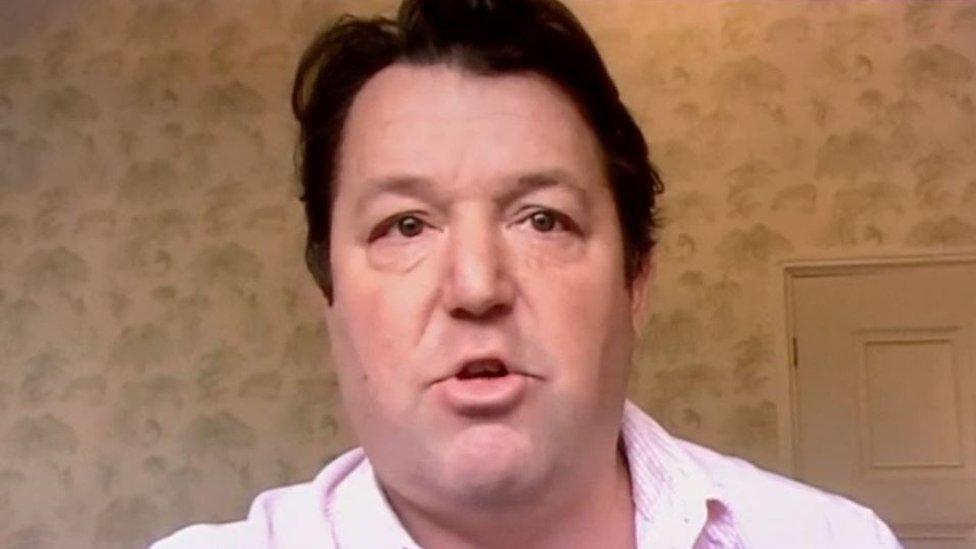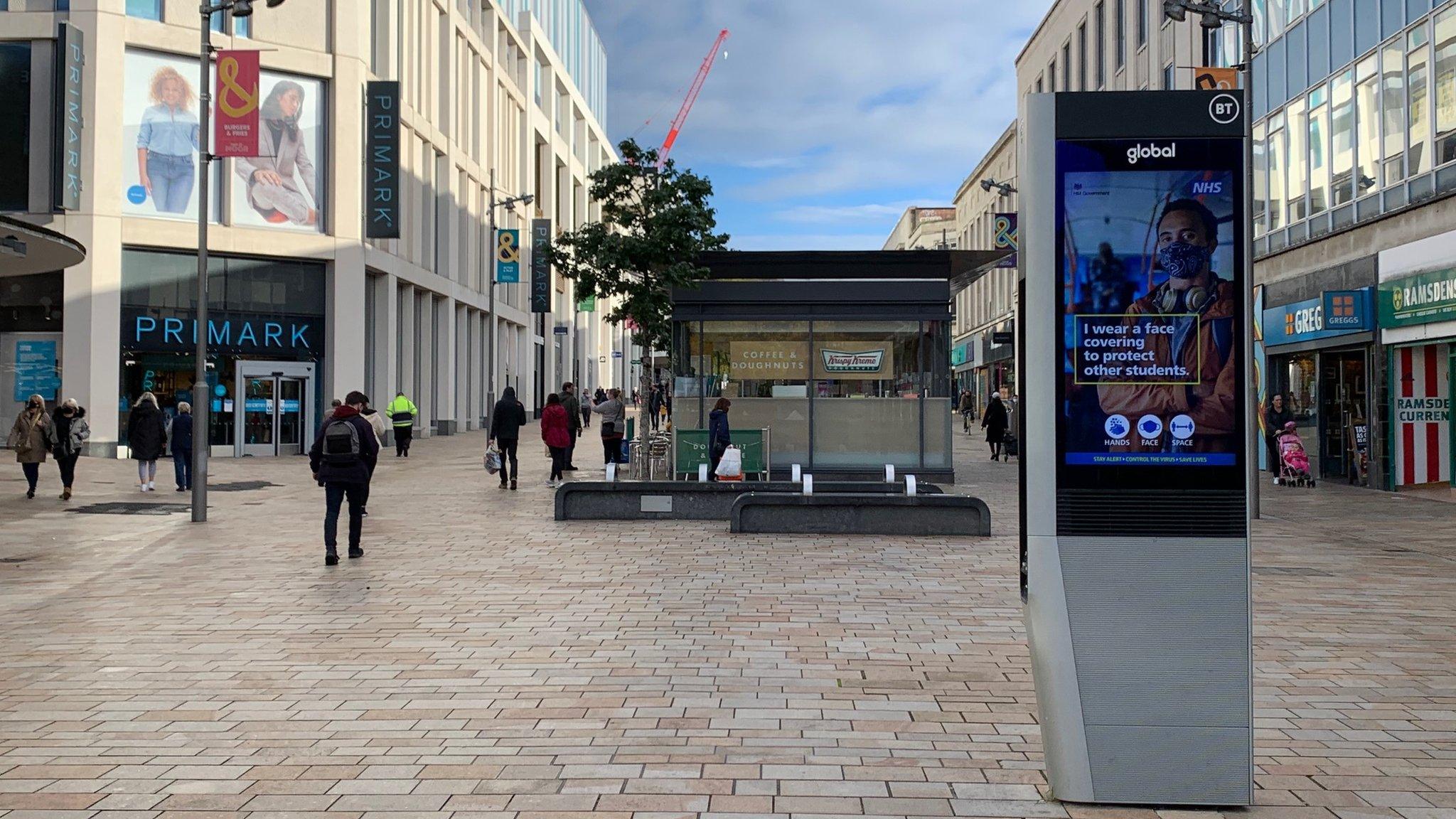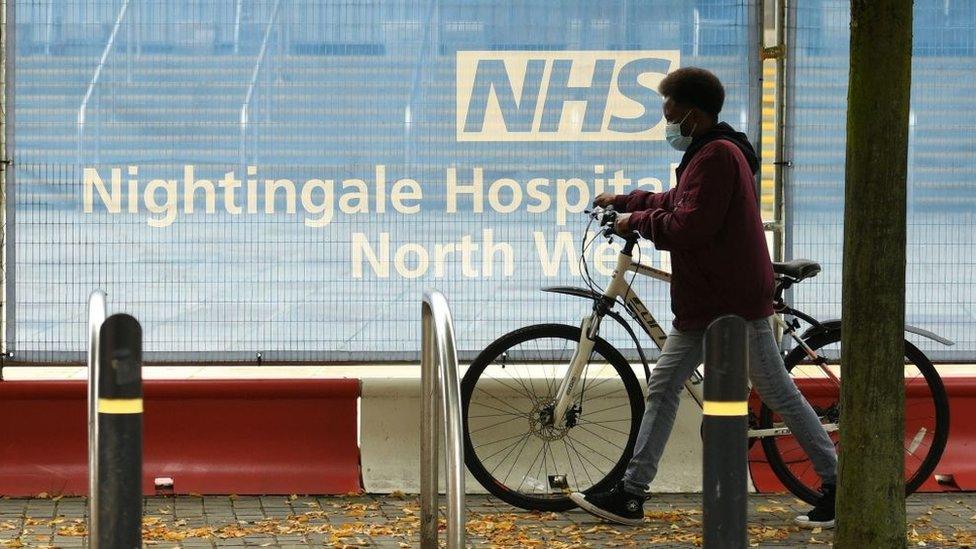Covid: South Yorkshire to move into tier 3 from Saturday
- Published
People in Barnsley town centre react to tier three restrictions being announced
South Yorkshire will move into tier three from 00.01 on Saturday, meaning 7.3 million people in England will be living under the toughest Covid rules.
Sheffield City region mayor Dan Jarvis said the move followed "extensive discussions" with ministers.
The rules will apply to all council areas in South Yorkshire - Barnsley, Doncaster, Rotherham and Sheffield.
Greater Manchester will be placed in the same tier on Friday, against local leaders' wishes.
Under tier three - England's "very high" level of alert which is already in place in Lancashire and Liverpool City Region - pubs and bars that do not serve substantial meals have to close, and there are further restrictions on households mixing.
Additional rules in South Yorkshire include the closure of betting shops, adult gaming centres, casinos, soft play centres and gym classes - though gyms will remain open.
Meanwhile, Coventry is to move to tier two from midnight on Friday, the city council has said, which will prevent households from mixing in homes and hospitality venues.
Chancellor Rishi Sunak is expected to make an announcement relating to support for workers and businesses affected by tier two restrictions in the House of Commons on Thursday.
BBC economics editor Faisal Islam said the government is understood to have acknowledged the reality that there are three tiers of pandemic shutdowns but only two tiers of support, with some firms suffering a collapse in business without being able to benefit from the Job Support Scheme.
It comes as a further 26,688 new coronavirus cases were recorded on Wednesday, external, while another 191 people were reported to have died within 28 days of a positive test.
It is the highest ever number of recorded daily cases. However, mass testing was not available during the peak of the pandemic, when daily cases were estimated to have reached as many as 100,000.
Health minister Edward Argar told MPs there have been more than 12,000 cases in South Yorkshire so far in October - more than in July, August and September combined - while the number of Covid-19 patients in intensive care has reached more than half that seen at the height of the pandemic.
He said he was aware the measures would "entail further sacrifice", but "bearing down hard" would help to slow the spread of coronavirus.
Doncaster's infection rate was 316 cases per 100,000 people in the week ending 17 October, compared to 370 in Rotherham, 395 in Sheffield and 415 in Barnsley.


Local leaders in South Yorkshire have agreed to a financial package of £41m, which includes £30m to support the region's businesses and £11m for local authorities to support public health measures like contact tracing.
Mr Jarvis said it was the "responsible route" and that "inaction was not an option" after its hospital admissions doubled in 10 days.
He insisted he had "moved heaven and earth to secure the maximum amount" of support for the region, which he said would help to reduce the re-infection rate and pressure on the NHS, while supporting the local economy.
It comes a day after new restrictions were imposed on Greater Manchester after talks with local leaders, who had called for at least £65m, broke down.
Prime Minister Boris Johnson said the £60m offered to Greater Manchester to support businesses and workers affected by the new restrictions would be distributed to the region's boroughs.

Was tier 3 agreed or imposed?

We all knew it was coming. But I was still surprised when the announcement leapt into my inbox at 09:02 BST this morning.
Over a million people in South Yorkshire are to go into tier three on Saturday. The phone started ringing and it hasn't stopped yet.
Agreed - or imposed? It depends who you talk to. It has been signed off by South Yorkshire but it doesn't mean all the leaders are happy about how it happened.
Chris Read, the Rotherham Council leader, is angrier than I've ever seen him.
He says it wasn't a negotiation at all - just the government telling South Yorkshire what it was prepared to offer. His point is if that was the case, why not do it a week earlier?
Miriam Cates, the Conservative Penistone and Stocksbridge MP, says it's a fair deal and heaped praise on Labour mayor Dan Jarvis.
We're all digesting how it will affect us day to day. People will be working out how to run their businesses, provide childcare and take care of their mental health.
A review is coming in 28 days but there is no magic number for when an area comes out of tier three.
People in South Yorkshire are being asked to bear the toughest restrictions, without knowing when they'll end.

The government's three-tier strategy of regional measures is designed to avoid a national lockdown.
Any areas in tier three will have its status reviewed after 28 days, the prime minister said.
The simplest way for areas to get out of those restrictions was to get the reproduction number, the rate at which the virus is spreading, down to one or below, Boris Johnson told MPs. Rates of admission to hospital and other data would also be taken into account, he added.
Mr Jarvis said it would be "very challenging" for his region to come out of tier three in 28 days "given the pressures of winter", but urged people to renew their efforts to ensure all local authorities had a "fighting chance" of coming out by then.


Other areas in tier two but known to be in discussions about tighter restrictions are West Yorkshire, the North East, Teesside and Nottinghamshire.
Talks between council leaders and No 10 about moving the North East into tier three have been "paused" following a fall in the region's infection rate over the past week.
David Mellen, leader of Nottingham City Council, said no "serious conversations" have been scheduled with ministers or senior civil servants, but he would expect any economic deal to be as good as other areas have received.

'It's devastating'

Jamie Hawksworth, who owns the Sheffield Tap, said he saw the new restrictions coming - but that won't lessen the impact.
"I think I speak for most of my staff, and certainly the management team, that it's devastating. We've had the entire business pulled from under us."
He added that the knock-on effect would be fewer orders for local breweries, abattoirs and other suppliers.



Meanwhile, Prof John Edmunds, a scientist advising the government, warned there was "very little chance" that Covid-19 would be eradicated.
He told two MPs' committees that people would have to learn to live with the virus "forever more" but it was an "almost certainty" that a vaccine could be ready in the "not-too-distant future", possibly towards the end of winter.

PANORAMA: Belly Mujinga: Searching for the Truth
ENSLAVED WITH SAMUEL L JACKSON: What happened to the 12 million enslaved Africans who were stolen from their homes?


How have you been affected by the issues relating to coronavirus? Share your experiences by emailing haveyoursay@bbc.co.uk, external.
Please include a contact number if you are willing to speak to a BBC journalist. You can also get in touch in the following ways:
WhatsApp: +44 7756 165803
Tweet: @BBC_HaveYourSay, external
Please read our terms & conditions and privacy policy
If you are reading this page and can't see the form you will need to visit the mobile version of the BBC website to submit your question or comment or you can email us at HaveYourSay@bbc.co.uk, external. Please include your name, age and location with any submission.
- Published21 October 2020

- Published21 October 2020
